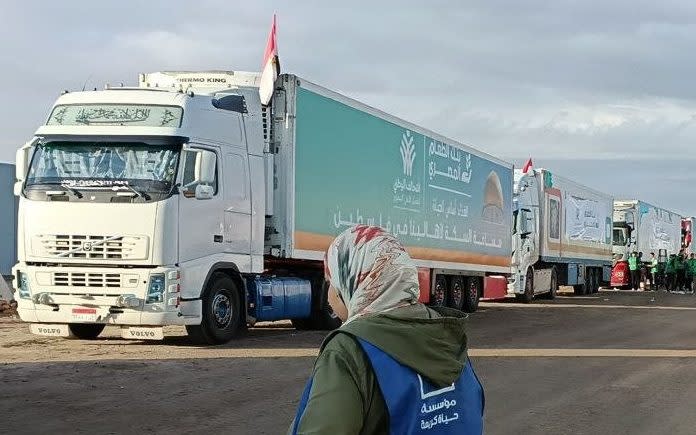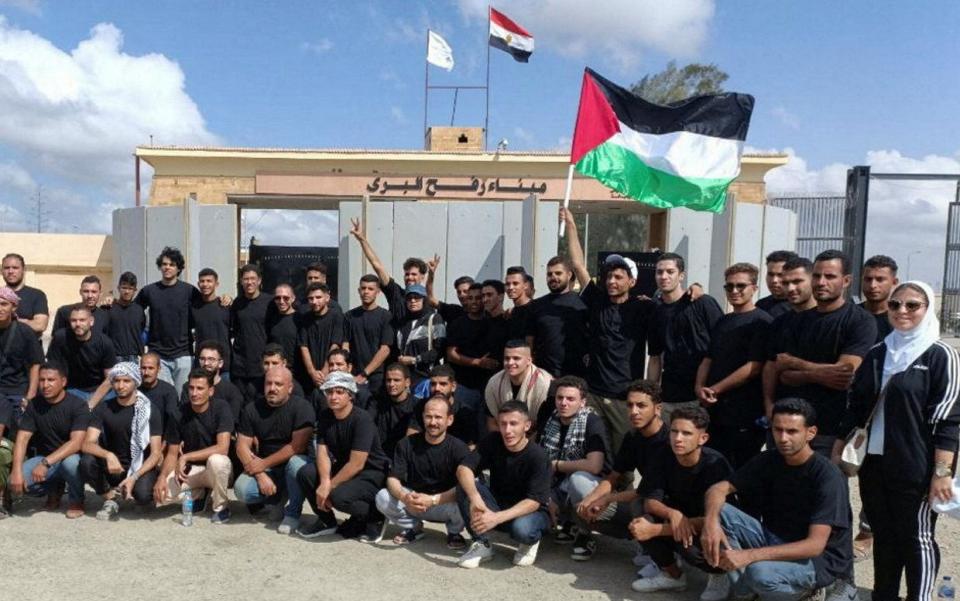Families of Israeli hostages express fury over humanitarian aid to Gaza

Relatives of hostages seized by Hamas have reacted furiously to Israel’s decision to allow aid into Gaza from Egypt, accusing the country’s government of “spoiling” terrorists “with sweets and medicine”.
A first convoy of up to 20 aid lorries could enter the enclave as early as Friday after Joe Biden, the US president, reached an agreement with Israel and Egypt, which controls the strip’s southern Rafah crossing, in the hopes that more deliveries will follow later.
Israel had previously said it would let nothing into Gaza until Hamas freed the more than 200 hostages it took during its attack on October 7.
The Hostage and Missing Families Forum said in a statement: “The decision to allow humanitarian aid to the murderers of Gaza has caused great anger among the family members.”
“Instead of working to regain the trust that has broken since that cursed Saturday, government officials have decided to provoke the families of the kidnapped and missing, and stick a finger in the eye of those who have not been sleeping or breathing,” it added.
“Children, babies, women, soldiers, men and the elderly – some of whom have serious illnesses, or are injured and shot – are being held underground like animals without humane conditions, and the Israeli government is spoiling the murderers and hostage-takers with sweets and medicines.”
The group’s remarks came as warnings of a mounting humanitarian catastrophe in the densely populated Gaza Strip intensified, and Israel’s police chief threatened to send pro-Palestinian protesters to the territory, declaring there was “zero tolerance for any instance of incitement”.

Kobi Shabtai, Israel’s police commissioner, said there would be no authorisation for protests expressing solidarity with Gaza as Israel remained “in a state of war” following Hamas’s attack.
“Anyone who wants to identify with Gaza is welcome — I’ll put them on buses that will send them there. I’ll help them get there,” he said in a video posted on the Israeli police’s Arabic TikTok channel.
Israel has imposed a total blockade on the densely populated territory while bombarding it with air and artillery strikes, depriving it of food, fuel, water and electricity supplies.
But after requests from Mr Biden, Israel’s prime minister Benjamin Netanyahu said he would allow aid into the Gaza Strip from Egypt. Supplies coming into Gaza through Rafah require Israeli approval and the US has warned any attempt by Hamas to seize the aid would see supplies halted.
More than 200 trucks and some 3,000 tons of aid are positioned at or near the crossing, Gaza’s only connection to Egypt, according to Khalid Zayed, the head of the Red Crescent for North Sinai.
On Thursday, machinery to repair roads was sent through into the enclave in preparation for the delivery of some of the aid stockpiled in Egypt’s Sinai Peninsula, Reuters reported, citing two security sources.
Rafah has been out of operation since the first days of the conflict in Gaza, following Israeli bombardments on the Palestinian side of the border.
‘Humanitarian crisis’
Tedros Adhanom Ghebreyesus, World Health Organization chief, urged Israel to allow fuel to be taken into the Gaza Strip, alongside the first deliveries of water, food and medicine.
Dr Tedros told a press conference: “We welcome Israel’s announcement yesterday that it will not block the entry of water, food and medicines into Gaza from Egypt. Fuel is also needed for hospital generators, ambulances and desalination plants - and we urge Israel to add fuel to the life-saving supplies allowed to enter Gaza.”
The United Nations has warned of a humanitarian crisis that threatens to spiral out of control in the Hamas-controlled Gaza Strip, with more than 2.3 million people trapped amid dire conditions.
Most of the territory’s residents depended on aid before the current conflict started, with about 100 trucks daily providing relief to the enclave, according to the UN.
Aid agencies warned that the plan for 20 lorries to enter on Friday would not stem the crisis, with a spokeswoman for the World Food Programme saying it was “nowhere near enough” aid.
Meanwhile, Israel’s military continued to pound the strip on Thursday, saying it had killed a leading Palestinian terrorist near Rafah and hit hundreds of targets across the enclave including tunnel shafts, intelligence infrastructure and command centres. Palestinians have launched barrages of rockets at Israel since the fighting began.
Israel has said it is attacking Hamas terrorists wherever they may be in Gaza. It has accused the group’s leaders and members of taking shelter among the civilian population.
The Hamas assault saw its terrorists kill more than 1,400 people. Palestinian health officials say more than 3,700 people have been killed in retaliatory Israeli strikes since the attack, including hundreds of women and children.
According to the Palestinian officials, 471 people were killed in what they claimed was an Israeli air strike on a hospital in Gaza City on Tuesday.
Israel said the incident was caused by a failed rocket launch by a Palestinian terrorist group and the US has supported its assertion, saying Pentagon intelligence suggested the blast was an “errant rocket fired by a terrorist group in Gaza”.
Egypt’s president, Abdel Fattah el-Sisi, and Jordan’s King Abdullah II both condemned what they called the “collective punishment” of Palestinians in Gaza on Thursday.
Ahead of a meeting between the pair in Cairo, the Jordanian royal court said the leaders would “discuss means to stop the Israeli aggression on Gaza”.
Antonio Guterres, United Nations secretary-general, meanwhile called for an immediate humanitarian ceasefire in the territory.
He called on Hamas to release the hostages it seized on October 7, and on Israel to give unrestricted access for aid during a press conference in Cairo.


